2023 Pride Journal—Stronger Together
2023 Pride Journal—Celebrating the LGBTQ+ Community With Pride
We are honored to share the 17th anniversary edition of our Pride Journal—a platform where our LGBTQIA+ Pfizer Colleagues and allies can share personal experiences of struggles, triumph, and their hope for the future in honor of Pride Month. Read the stories that have provided inspiration to so many:
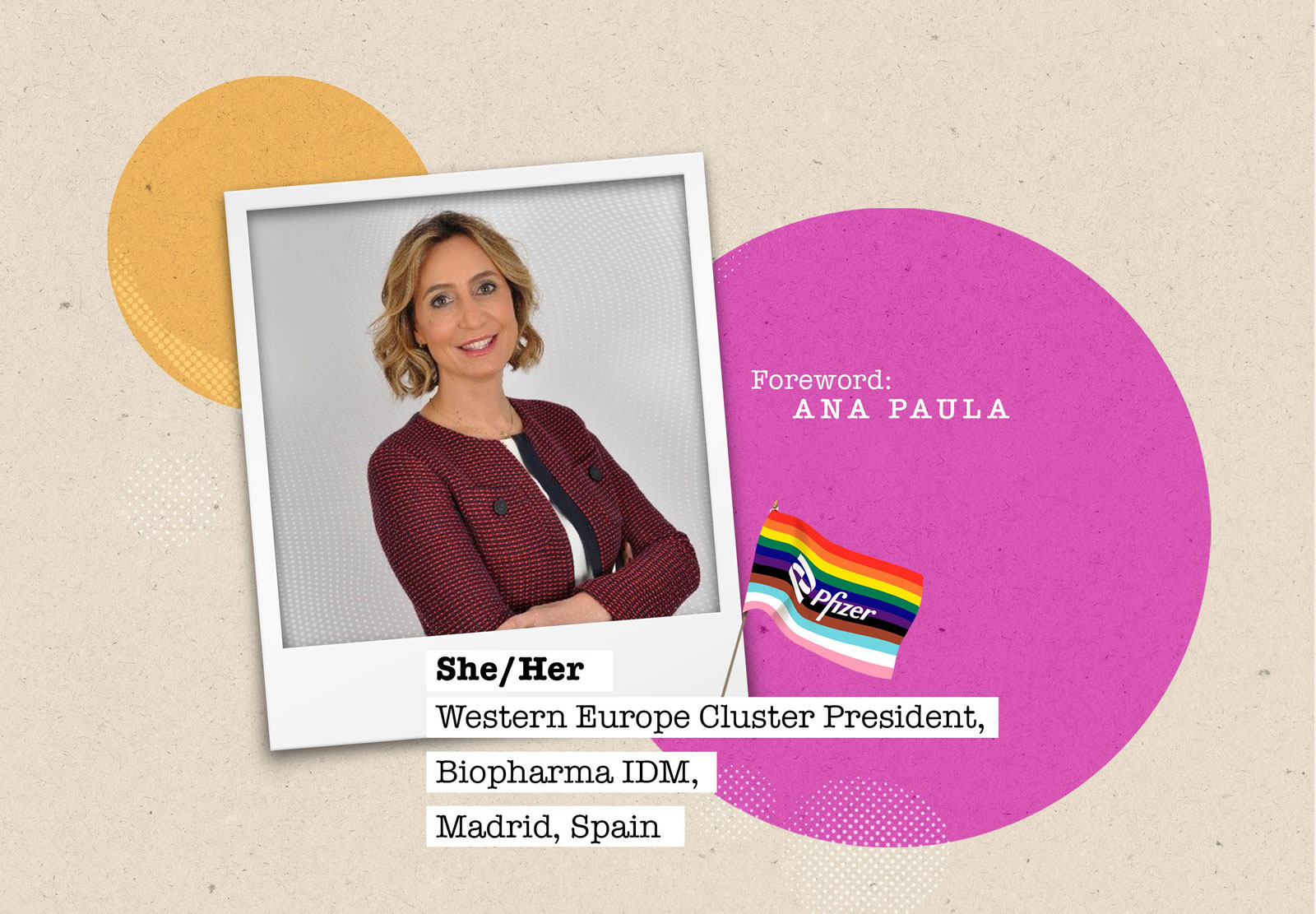
Dear LGBTQ+ community, friends, and allies,
I’m honored to welcome you to Pfizer’s 2023 Pride Journal. Let me start by sharing my hope for all of us and especially for the LGBTQ+ community: that we can be proud of who we are, every single day at Pfizer and that we may feel at home at work.
For decades I have been DEI passionate and continue to strive for acceptance and inclusion every day, ever since I myself experienced as a young and innocent child how being different in the eyes of others can affect you.
I grew up with my loving parents and brother in the beautiful Mozambique. When I was five, the independence of Mozambique became a reality, and our family returned to Portugal. We landed in a country that seemed new to us after so long living in Mozambique and started from scratch. My brother and I were left alone at home while my parents worked around the clock at minimum wage jobs to make ends meet. I learned very early in life that through the eyes of others, I was different; on many occasions we were treated as second-class citizens. I know what it feels like, not to be seen or cared for, just because of being myself.
Despite this being a difficult experience, it also positively affected my personality and behavior in many ways. I sensed the importance of having a sense of belonging and I promised myself I was going to always include others and actively advocate for equity.
This year’s OPEN theme Stronger Together is so well chosen. We need each other’s support to live a fulfilling life; we need each other to be successful. But most essentially, we need each other’s support to be able to feel at home at Pfizer. I believe that every colleague has the responsibility to be open and caring. Open to accept you for who you are, open to stand up for you when you are struggling, open for you to grow and flourish. And open to bringing your true self to work every single day.
Together, let’s celebrate our differences, as we are stronger together. We all play a role in ensuring Pfizer is a safe place for all of us and that we’re valued for who we are.
If we can accomplish that, it will allow each of us to bring our best selves to work, to be innovative, creative, and brilliant. We need each other, regardless of our gender identity or expression, sexual orientation, race, ethnicity, age, abilities … to work together, to innovate together, to have joy together.
We is stronger than Me. With the great work of OPEN, our local CRG’s and colleagues, we’ve already come far, yet so much work is still to be done for our OPEN community.
What can we individually do? This is my personal call on all of you to be(come) OPEN allies: welcome, accept, and cherish all OPEN colleagues. Continue to raise awareness around LGBTQ+ issues, speak up when you experience or see inequity, become a mentor for a colleague in the LGBTQ+ community. Together, we continue to build our OPEN culture.
Enjoy this year’s Pride Journal, which gathers personal colleague stories from around the globe. Enjoy Pride Month and take time to reflect on how you can become an even more active ally.
Warm regards,
Ana Paula

This year’s Pride Journal theme “Stronger Together” evokes so many emotions for me and brings distant memories to the forefront; memories that may have been painful at the time, but are now viewed through a lens of positivity, growth, and strength. I entered the workforce at a very different time; a time where I didn’t feel like I could be myself at the office, so work relationships were built on superficial lies intended to protect myself from judgment and shame. I felt like my career opportunities would be limited if people knew who I really was, and the quality of my work wouldn’t matter as much as people’s judgment of my personal life.
Throughout my career, I’ve witnessed a changing world; an evolving society not only for me, but for other marginalized groups as well. We have much further to go, but we must celebrate our wins along the way as we push toward a more prosperous and equitable society for all. I firmly believe it is the power of unity that has led to the changes we have seen thus far; changes that have led me to a point in my career where I believe my uniqueness is celebrated, not judged. Gratefully, I work for a company that values me bringing my authentic self every day. Words matter, but as the axiom says, “Actions speak louder than words.” As a Pfizer colleague of 17 years, I can honestly say I am so proud to work for a company that backs up its words with actions. I would like to focus on three specific actions Pfizer has taken that have shown me how committed the company is to creating a safe workspace where we can all thrive.
First, Pfizer is committed to creating community by investing in its colleague resource group (CRG) network. The Out Pfizer Employee Network (OPEN) CRG has been a tremendous resource for me, allowing me to engage with people I wouldn’t have otherwise met, and be inspired through learning about their life experiences, some similar to my own, and others revealing journeys I never could have imagined. This open dialogue is fostered by our CRG(s), and through this new set of connections, we are “stronger together.”
Next, I will never forget when I learned Pfizer had signed on to the Amicus Brief for critical Supreme Court cases that would ultimately lead to marriage equality in the United States. It was a demonstrable action that the company took to fight for what was right, not necessarily popular. Through the actions of Pfizer and 378 other companies signing on to the Amicus Brief, I saw the true power of corporations being “stronger together.”
Finally, I would like to credit the culture that encourages allyship here at Pfizer. Through not only its CRGs, but its overall culture, Pfizer celebrates diversity, strives for equity, and acts inclusively. We know we are part of a network of people who are simultaneously similar and yet different from each other, and we are always seeking ways to be better co-workers and friends. I have been fortunate to have allies who actively support me and my community; people who have wanted to get to know and celebrate the real me. Some of my strongest allies have become my mentors. I have also been very fortunate since the day I became a colleague to have been supported in my authenticity by my direct managers.
Throughout my career with Pfizer, I have heard phrases like:
“I got your back.”
“We’re in this together.”
“You’re not alone.”
Our CRGs welcome and encourage allies to become part of our membership, because we know that by aligning for a common cause, whether directly or indirectly affected, we are still “stronger together” as we drive toward what is right and good in the world.
In the spirit of sharing good things, I am thrilled to announce in this public setting that last year I got married! The institution of legal marriage was not even available to me for most of my life, so the weight of even being able to say those words cannot be overstated. “I got married!” Wow ... it still feels unreal. It was only through the valiant efforts of community togetherness and activism, and the support of companies like Pfizer fighting for our rights, that I was able to legally marry my now-husband Tom in October of 2022. I witnessed firsthand the coming-together of families and friends who surrounded us with so much love and support. And through modern technology, our wedding ceremony was watched through live broadcast across the globe! While we stood in the front of that room and joined together as one, I can honestly say we tangibly felt the power of that collective love and support.
Now, I am part of something bigger; I have the opportunity to go through the rest of my life alongside my spouse.
No doubt we will still face many challenges ahead, but I know that with all our allies by our side, and the company standing behind our community, we are, and will continue to be, so much “stronger together.”
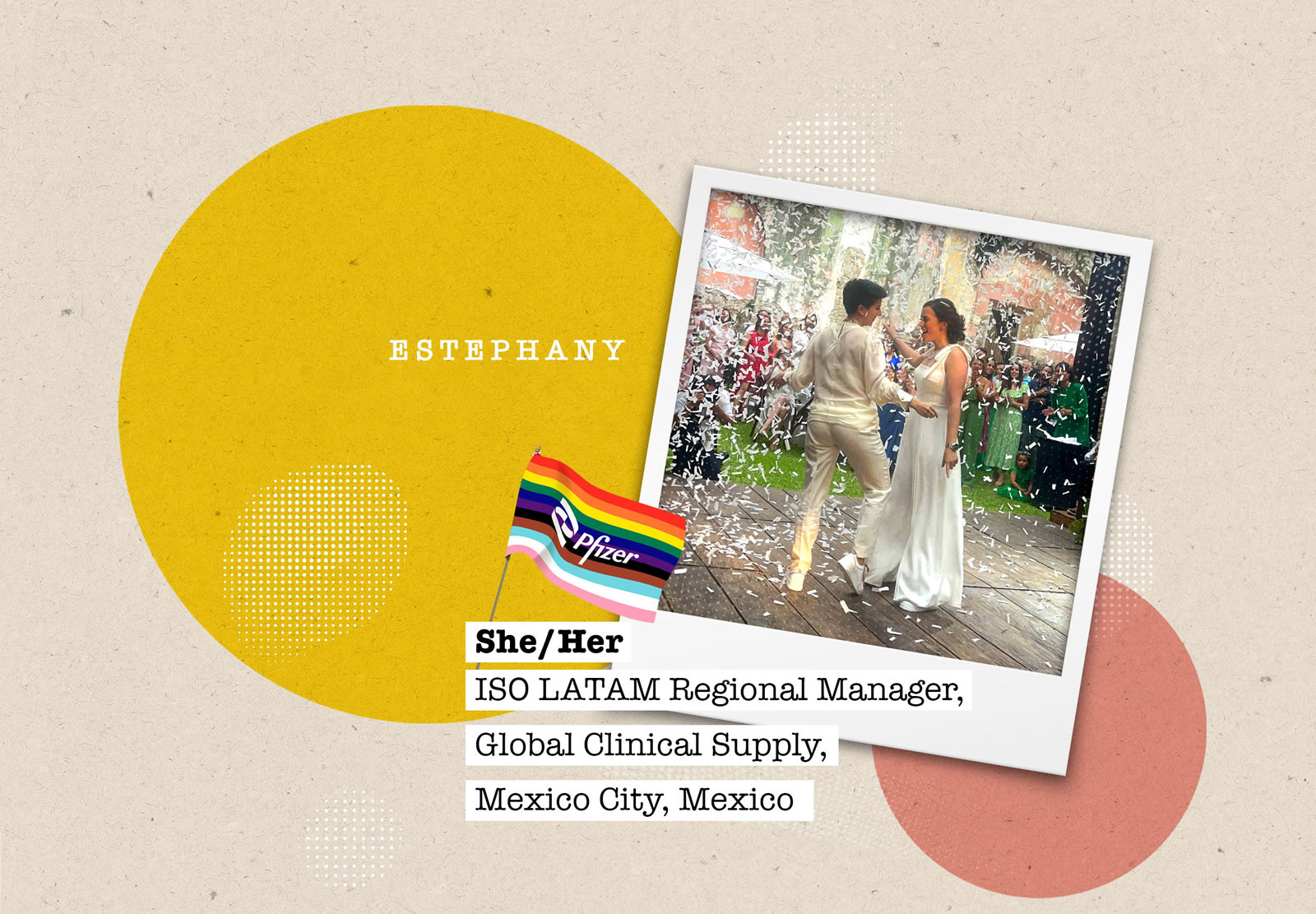
I grew up in Mexico City, a cosmopolitan city where I got to see diversity in all senses, especially with different examples of LGBTQ+ community members in the streets. As a child, I was different from other girls; I never really liked wearing dresses, pink things, or dolls. Most of my friends were boys. I was always a sporty girl, and I was always climbing onto something or trying new things.
As long as I can remember I’ve always liked girls, and even while living in this diverse city it wasn’t well received to have a LGBTQ+ son or daughter or even a LGBTQ+ member in the family. Mexico is a very religious country and there have always been expectations from family members on how you are supposed to live your life and discrimination exists against people who are different.
It was not until my college years when I finally felt like I was in a safe space. My university always created a safe environment for LGBTQ+ students and everyone was able to be their true, unique selves. Also, laws in Mexico protecting LGBTQ+ rights were evolving at the time. That really helped me come out to my family and closest friends. I knew this was the first of many steps I needed to take, but this step was the most challenging and important one because I really didn’t know how they would react. Fortunately, my friends and family were a welcoming community for me and have always had my back.
It wasn’t easy for my mother at the beginning, especially since she felt that being a lesbian would put blocks in my professional development path and she worried about the discrimination I could receive in the streets or in my work because of that. It wasn’t until after ten years of working that I felt comfortable speaking openly at my work about my sexual orientation and my partner.
Having role models in the LGBTQ+ community in different work environments helped me understand that those beliefs were not true, at least in the industry I have been working all my life.
Finally, my mother’s love for me was stronger and she started not caring about what society would think.
It has been a long journey since college, but a happy one. Sofia and I met five years ago, and we both were fortunate enough to have supportive and open families who have always been a safety net for us. We married on April 29, 2023 and being able to marry the woman I love and enjoy our happiness with our loved ones has been pure MAGIC.
I want to become a role model for the new generations and create safe spaces and supportive networks for everyone in the LGBTQ+ community because I can’t thank enough the role models I had when I needed them the most.
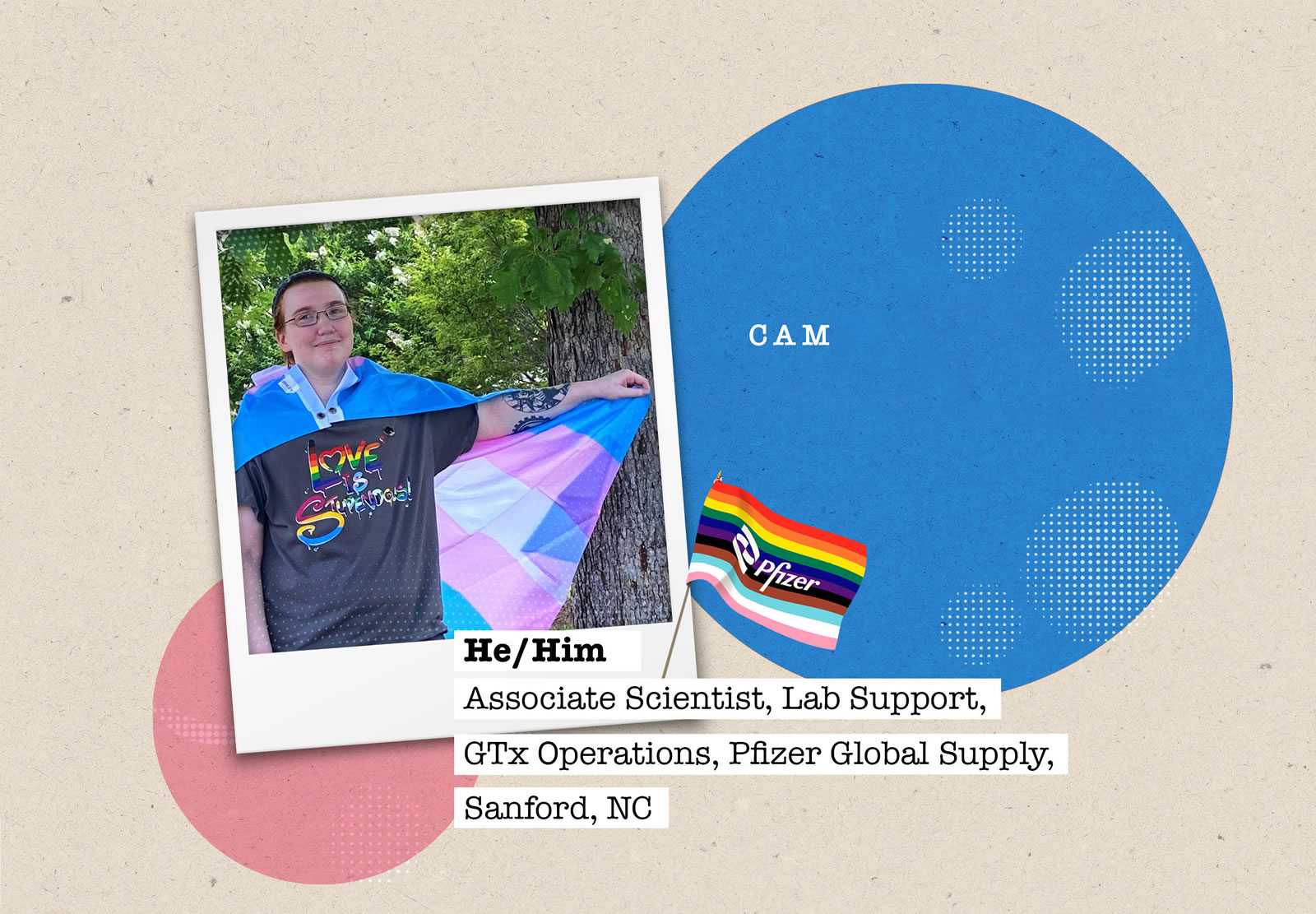
I am a transgender colleague working in Sanford, NC. I always knew there was something a little different about me than my peers from a very early age—more than being a “tomboy” when growing up in Chapel Hill, N.C. It wasn’t until a school assembly in my mid-teens that the word “transgender” hit my radar, but it didn’t occur that it applied to me until my early twenties.
When I first started working with Pfizer as a contractor. I was genuinely unsure of how my colleagues would react to my coming out to them, but when my supervisor at the time gave me his full support, it gave me a sense that I’d be accepted here while I began my journey.
When I decided to come out to a close family member around that time, it did not go as well as I’d hoped and the experience left me feeling discouraged. Had it not been for the welcoming atmosphere at the Sanford site, I don’t think I would have come out to the rest of my team.
However, I began to talk to teammates that I felt I knew well, and the responses I received when explaining my identity were overwhelmingly positive and supportive.
Those who were not as familiar with what it meant to be a transgender person were respectful and willing to learn. It did not take too long before the whole group knew I was transgender.
Following my first gender-affirming surgery in 2017, my colleagues in the department at the time were incredibly supportive and understanding during my recovery and further convinced me that this is a space where the LGBTQ+ community was welcomed and supported.
I genuinely believe I have Pfizer to thank for a lot of my confidence in being my authentic self. I was never made to feel like an outsider in my group as I had been in previous jobs. My marriage to my wife of now three years was celebrated; my pronouns are respected; and when I was brought on as a colleague, I was offered yet another welcome space with the OPEN CRG.
Thank you, Pfizer, for supporting me throughout my journey!
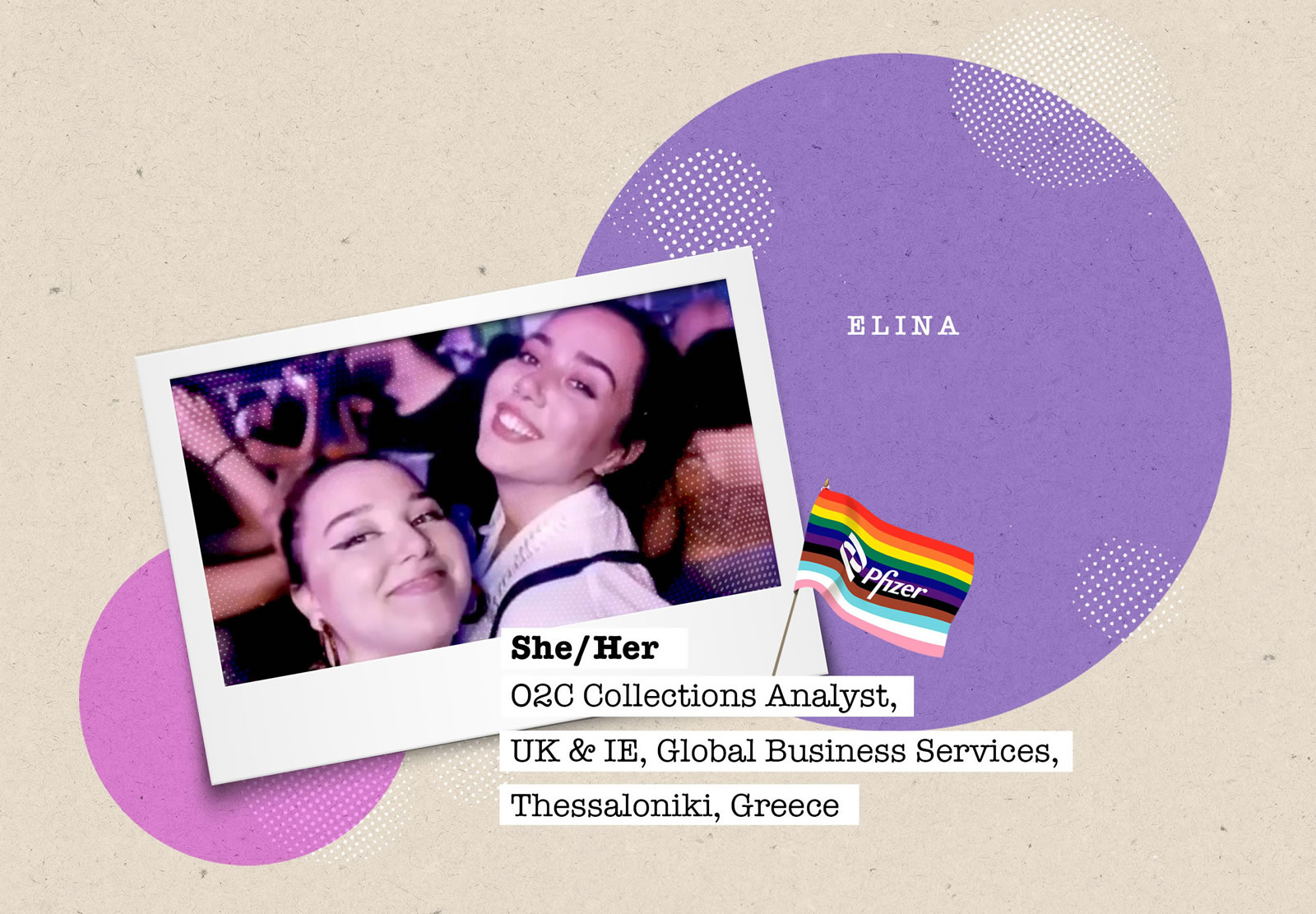
My story is a short one in length; however, it was a significant point in my life when I realized my role as a sister. I grew up in a bonded family of four—two parents and two sisters—in a rural area in Northern Greece. My younger sister and I have two very supportive parents; they are very loving and protective. The relationship between my sister and me was great. Given the fact that we are only 3 years apart, we would spend many hours together hanging out and having deep conversations.
During my childhood I never felt the need to question my sexual orientation, the environment in which I grew up was “straight by default.” However, to nobody’s surprise, at around the age of 16 I realized that I might actually be bisexual. I kept it to myself at this age as I was unaware of how to approach it, and I never had “the” conversation with my parents about it.
At the age of 18 I left my family home to go study in Thessaloniki. Being a young adult in a bigger city, I felt the freedom that comes with right away. I immediately started feeling so much better about myself and my body. Within the first semester of my university studies, I knew who I was and where I’d stand in life.
As the years were passing, I kept a very close relationship with my parents and sister, however, any romantic relationships I may have had were never a topic of discussion.
Last June 27 was the day I mentioned at the beginning that made me shake in my boots. My sister and I were visiting Athens for the weekend to attend a music festival. A few hours before the festival began, we were having lunch at a restaurant with amazing views, great weather, and high spirits due to the excitement. Overall great vibes.
The artist we were most excited to see live is the Italian singer LP. If you’re not familiar, LP is an openly gay woman who was freshly split from her girlfriend at that time. As we are having lunch and talking about what songs we were most looking forward to hearing, I said to my sister, “Isn’t LP just so attractive?”
My sister went fully silent, and her eyes got wide as if she saw a ghost walking behind me. After a couple scary and awkward seconds, she said, “Do you like girls?”
Myself, I never needed to say it out loud; it was just so natural to me that I couldn’t imagine having to declare such a thing. So, I told her yes, and I smiled.
At this point my sister can no longer hold the tears. She starts crying and I don’t know what I did wrong. The thoughts in my head were something like “I cannot believe my sister is so regressive.”
It took her some minutes to regain her calmness, during which I stared at her, not saying a word. After that, she looked at me and said, “If I knew earlier that someone would understand me, I would be so much more open about myself.”
This was the phrase that made me realize my role. My sister had been in a relationship with a girl for over two years at that point. We knew her girlfriend, but we thought she was just a friend. They would go on trips together and my sister would lie to us saying they were with a big group of friends to cover any suspicions.
Ever since that moment, my sister has had a lifetime ally and she can express herself openly. Our relationship has grown so much stronger because I finally know 100% who my sister is. Our parents were never an obstacle in any of this, they just never had any exposure to other-than-straight sexuality.
Speaking up, being open, and being unapologetically you will always bring you closer to the people you are destined to surround yourself with.
And this is a lesson taught by my sister, along with LP’s assistance.

I remember the days from early in my career when I would dread the potential for small talk with colleagues when they would ask, “What did you do this weekend?” These were awkward situations where I would feel uncomfortable sharing any specific details surrounding my personal life.
My story begins just outside Chicago (in Cicero). I come from a family of first-generation immigrants. I am the youngest of five children, the only one born in the United States. My mother and father fled Vietnam in the late 70s as life became too difficult for those who fought for the South during the war.
Growing up, I struggled with low self-esteem, mainly from being bullied for looking and acting differently than my peers. I came to terms with my sexual orientation during high school but hid it from everyone because I was terrified of what they would think of me and the potential negative implications on my future. Mostly, I was afraid of how my family would react and how they would treat me if they found out.
It wasn’t until pharmacy school that I finally built enough courage to come out to my best friend. It was a domino effect after that.
With each person I came out to, I gained more and more confidence. I realized that I was not alone. With the support of a close-knit group of friends, I finally dared to come out to my family. It started with my older sister, closest to me in age, followed by the rest of my siblings. I was most uncertain about how my mother and father would react. Both did not initially handle the news well, teetering from denial to thinking about what they did wrong raising me. Like the situation with my close friends, my siblings’ support helped my mother and father slowly accept and understand that nothing was wrong with me. It took several years for them to get to this place of acceptance. In retrospect, I realize it was because they grew up in a completely different culture where the topic of being gay was never spoken of.
I married my husband Jon in August 2019 before my entire family, including my mother and father. It was a moment I never thought would happen, seeing my father cry tears of joy as I married the love of my life. Sadly, my father passed away in February of 2021. I am so grateful that my entire family was there on my wedding day. It would not have happened if I had given in to the fear that plagued me growing up.
I now carry this self-confidence into the workplace. At the beginning of my career, I avoided discussing my personal life with co-workers. But now, I am an open book.
Being gay does not define me, but it is an integral part of who I am.
I am so grateful to be a part of an organization like Pfizer that allows me to be myself and provides a sense of belonging for my LGBTQ+ community.
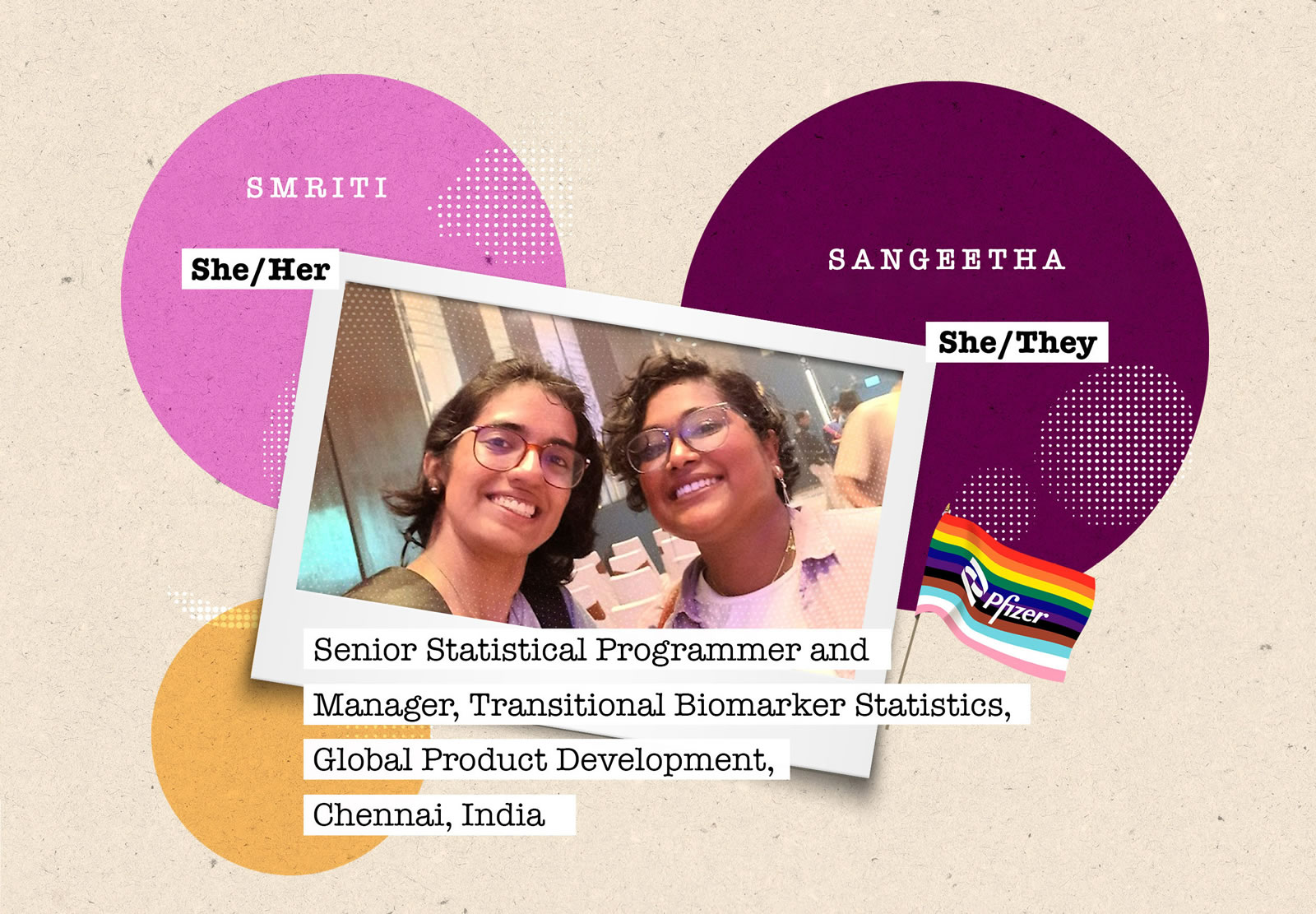
Smriti: I have been out at Pfizer—quite loudly—for 2 years now. Until a year ago, I was the only out queer person I knew at my workplace in Chennai. Coming out felt like a huge risk, and I knew being so visible wouldn’t be easy, but it was important to me to show others that people like me exist in the Indian workplace as much as anywhere else. Last year, I started connecting with some members of the global OPEN colleague resource group (CRG), and I wrote about my experience of being out in the 2022 Pride Journal.
I wanted to start actively making changes, so I researched how to start a CRG at my site and realised there were no sites in India and hardly any in Asia. I knew that even with growing support from my friends and allies, it would be daunting to kickstart a CRG by myself, so I was stuck.
Then, by complete coincidence I met Sangeetha at the first Pride march I’ve ever been to. I felt so joyful when I found out she worked just 2 floors below me. For the first time ever, I wasn’t alone in my queerness at the place in which I spend most of my time.
Having one other person on my team made such a difference that I was now willing to be ambitious and try to actively build the safe space I always wanted.
Sangeetha: Being queer had been so alienating as a kid growing up in a very conservative society. Always being questioned for the way I speak, the way I behave, the way I EXIST! I was never able to fit in with my friends and peers while growing up. Even with my closest friends, there was something missing; something felt distant; and it was a lonely journey without understanding why.
There was no queer representation on TV, movies or anywhere else—at least not in the positive ways. This included no visibility on being bi or pansexual. Being conditioned to always have my relationships around men, and with my feelings towards women labelled as a “special friendship,” it took 10 years of unlearning to even understand that my first crush was a woman.
From being constantly confused and hating myself for it, to accepting and embracing who I am: what a journey it has been in the past decade. I wish someone had told me that being myself is okay and that I don’t have to feel guilty about just existing and breathing. That I am worthy. That the way I dress or the length of my hair doesn’t define who I am as a person. That I am allowed to be in love with whoever I want and the only permission I need is from myself. That I am not alone.
I met Smriti during a pride parade in 2022. It was surprising to meet another queer colleague for the first time in the streets of Chennai during a pride parade, yet we were working under the same building for over a year. And the past year has been a lot of personal growth, healthy conversations and learning to be comfortable in my own skin and not just with those I’m closest.
All it takes is just ONE person. That one person who inspires you to be your authentic self and not be afraid of expressing it.
Stronger Together: When Smriti approached me about starting an OPEN CRG at Chennai, it was a no brainer. I was not out at workplace until then. But having someone with you on a similar journey really helps with having a safe space to just be and express yourself. We wanted to expand this space to all other queer colleagues at the site and successfully started a chapter in October 2022. Our OPEN CRG has received a slow, but positive response from colleagues. Even though we have a long way to go as a country, this is a first step in the right direction especially considering the conservative nature of the country and current cultural attitudes.
Joining the larger OPEN community at Pfizer and having the support of colleagues globally has empowered us to take new initiatives and approaches towards our own site, including finding ways to encourage inclusive practices here. We’re excited to interact with LGBTQIA+ colleagues and allies and foster an environment that accepts and lets everyone thrive.
Now that we have started to build a community here, we are hopeful for the future: one where we will have the support of active allies and where more people will feel safe and confident in being their authentic selves.
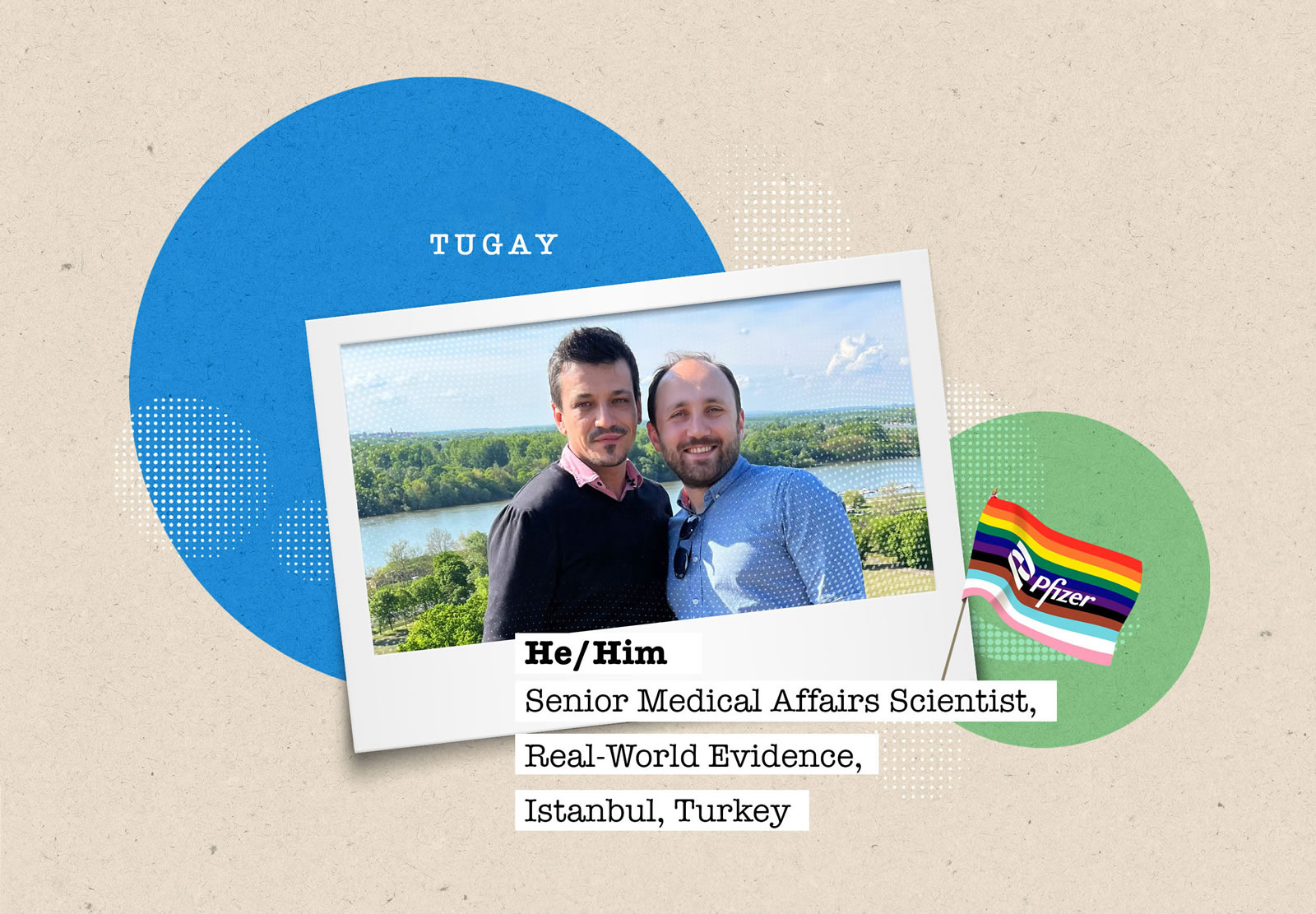
Born in a small village in north-central Turkey, where being different was not only frowned upon but also not spoken about, my early life was marked by a feeling of profound alienation. The conservative environment left me feeling like a square peg in a round hole, and for the longest time, I couldn't figure out why. There were no role models for me to identify with, and the concept of being gay was so alien to my community that I first heard it as part of an insult. “Unmanly” traits, as the teens and children perceived them, were the subject of constant mockery, and without noticing, I suppressed my feelings deep within, developing an internalized homophobia.
The feeling of being different was not just confusing but also incredibly painful. It led to a battle with depression and anxiety, a battle that I fought alone. I hated the parts of myself that didn't fit the societal norm, and in doing so, I was my own worst enemy.
It was not until my first month in medical school that I heard the term "LGBTQI+" from a psychiatry professor. He explained that it was part of the natural diversity of human beings. I remember the feeling of a sudden revelation washing over me, shaking me to my core. For the first time, someone had openly stated that being gay was not a curse and it was just another facet of human nature.
This was a turning point in my life. I decided then that if I were to become a medical doctor, my first responsibility would be to help myself and my community. I joined solidarity associations and made friends within the community, slowly coming to terms with my identity and fighting the internalized homophobia that had been a part of me for so long.
As the LGBTQI+ community became more visible in our country, the political oppression intensified. We faced attacks and interventions, and though I was an activist in the medical field, I had to hide my identity in the public sphere. I was a public service physician, but the threats of eviction and harassment were constant. It was an untenable situation, and I knew I had to make a change.
That change came when I joined Pfizer Turkey and became part of their diversity and inclusion colleague resource group, called Mosaic. We pointed out some inequities that we faced, such as the fact that marriage or civil union is not legal in Turkey and asked for the same insurance coverage for our partners as married straight couples have. Our HR leadership team heard us, worked tirelessly to make our voices heard and address the inequities we faced, and made it possible to extend our insurance to our partners. This was the first time this had ever been done—an unprecedented move in Turkey! And it became an excellent example for other companies to follow.
Working at Pfizer was a breath of fresh air for me and my partner. For the first time, we felt seen, heard, and valued in our working environment. We could be open about ourselves and our partnership without fear of harassment or discrimination. However, it wasn't always easy. I must confess that even though I was out at work and didn't deny my sexual orientation when asked, I have always felt it challenging to proactively talk about my “historically marginalized” family union in usual conversations.
While Pfizer does not tolerate explicit homophobia, the subtler forms, the implicit biases, still permeate our day-to-day interactions. These biases are insidious, often difficult to pinpoint, and even more challenging to confront. They're the silent reinforcements of stereotypes, usually unnoticed but perpetuating a culture of silence and invisibility. They surface in the most mundane scenarios—a casual conversation around the coffee machine where straight colleagues can effortlessly talk about their partners and children. Yet for us, the same interaction requires a delicate dance, a careful navigation to avoid sparking negative perceptions or unintended consequences.
So, while we've come a long way, there's still much work to be done. The fight against these subtle biases is an uphill battle, but it's one we're ready to confront head-on, for a future where everyone feels seen, heard, and valued.
Nonetheless, I was grateful for the support and acceptance I received from my colleagues at Pfizer. It gave me hope that there could be a day when LGBTQI+ individuals are accepted and celebrated for who they are. While there is still a long way to go in Turkey and around the world, I know that we are “stronger together!”
Still, I know many people around the world don't have the same privilege or opportunity to be accepted and valued for who they are. That's why I will continue to speak out and fight for LGBTQI+ rights and inclusion. No one should have to live in fear or be ashamed of who they are.
To anyone who is struggling with their identity or feeling alone, I want to say you are not alone. There is a community of people who are just like you and who accept you for who you are.
It may take time to find them, but they are out there. And remember, there is nothing wrong with you for being different. We are valid, we are loved, and we deserve to live a life free from discrimination and fear.
Today, I stand here, openly and proudly proclaiming that I am gay. I am committed to explaining, fighting, and working until everywhere in the world is a place where we can be free and valued. The road is long, and the journey is tough, but together, we are unstoppable. We are here, we are seen, and we are valued. And we will continue to strive for a world where everyone, regardless of their sexual orientation, can say the same.
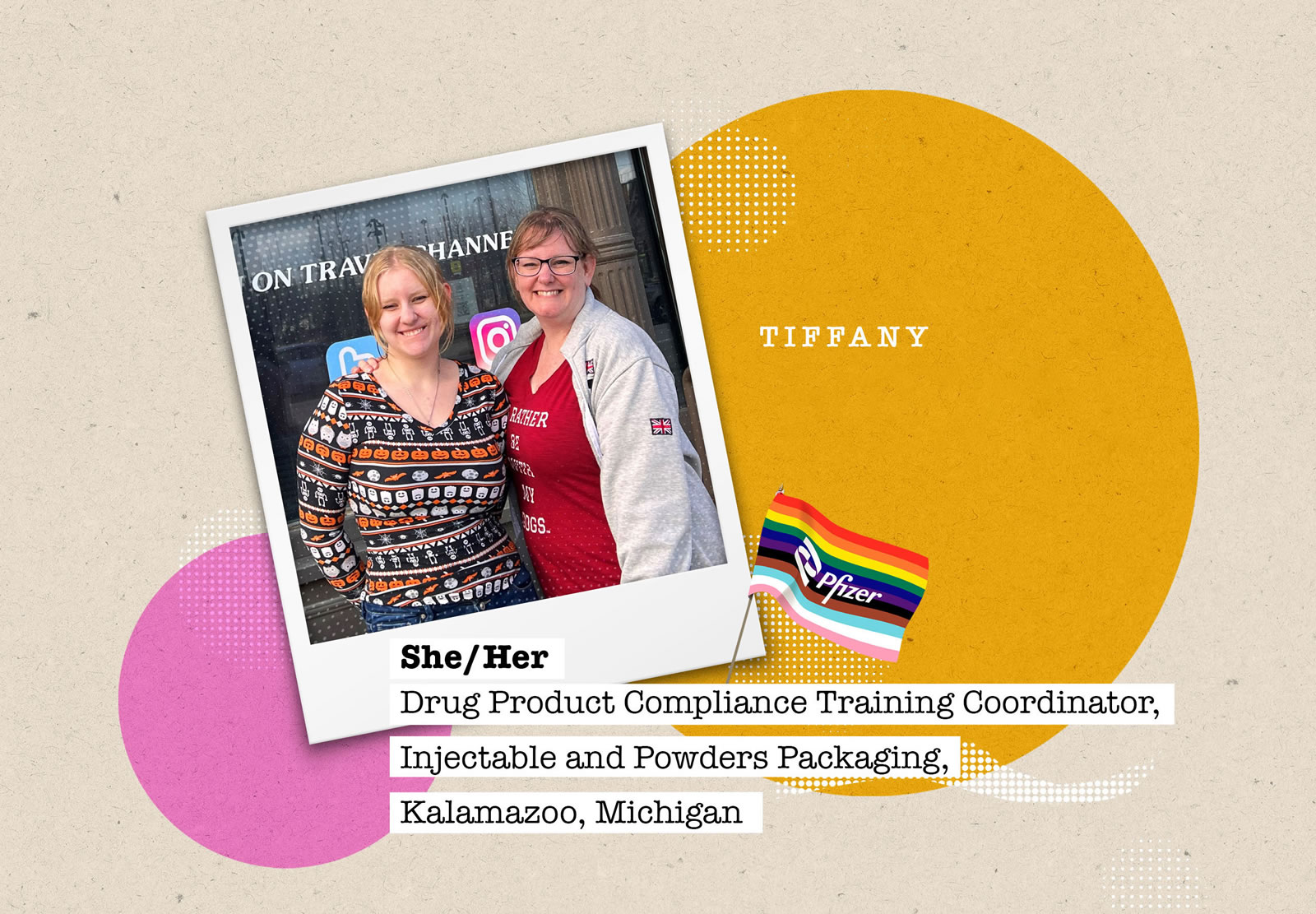
When I was in high school, “gay” was still a slur that was commonly thrown around. I had friends who were not only bullied, but physically assaulted as well. I then attended a Catholic college that nonetheless had a thriving gay and transgender community. I witnessed my friends struggling with what they saw as a battle between what their hearts were telling them and the rules of their faith. At the same time, my cousin came out. My uncle immediately cut her out of his life. She was one of several people in my life whom I absolutely loved, and wanted a better world for.
Directly out of college, I got an apartment with my friend, Daniel. We then moved into a townhouse with three other friends. I now had three gay men in my life who were more like family than just roommates. Our shared social circle was made up of so many beautiful, loving LGBTQ+ people that one could feel insulated inside our happy bubble sometimes. Unfortunately, all it would take was a trip to the store to realize that the late 90’s/early 2000’s were still not a welcoming place for everyone. Seeing people I cared about throughout high school, college, and beyond being treated as “less than” planted the seeds of allyship in me.
I feel very fortunate to have had the friends and family members I’ve had who confided in me that they were gay, transgender, and bisexual. I had the greatest honor of being the first person two of my friends told. The fact that life gave me the opportunity to know these people and openly love them meant that my daughter saw this. She saw that I loved my friends and family for who they were, and that made her comfortable enough to come out to me, herself. I’ll confess that I fear for her, sometimes. The world may have improved in a lot of ways in its treatment of LGBTQ+ people, but there is still so much to overcome. From threats of repealing marriage equality to the increasingly alarming dangers facing the transgender community, there is a lot of work to be done. I still feel grateful, though. I am grateful that she told me, and grateful that I’ve seen the world is capable of changing for her and others like her.
One of my favorite things about Pfizer is that we didn’t just draft a policy of diversity, equity, and inclusion and slap it in a handbook. Instead, these values are woven into the fabric of who we are as a company.
Here at the Kalamazoo site, our OPEN colleague resource group leads classes on allyship, with a very successful voluntary turnout each time. We support the Pride events in both Kalamazoo and Battle Creek. We are currently building gender neutral bathrooms and locker rooms. We live our values every day, and I am happy to see my LGBTQ+ friends and coworkers at Pfizer feeling safe and included. I am also thankful for the fact that I have never had to censor myself when talking about my daughter. I can talk about every aspect of my daughter’s life and not have to worry that talking about her at work could be dangerous for her or limit my own career. It still feels like change happens way too slowly, but I am confident that we are on the right path every time I look around at work and see people able to be their authentic selves every day.
My goal as an ally at work is to support the cause of equality in any way I can, for my coworkers, for my friends, for my cousin, and most of all for my daughter.

I remember when I joined Pfizer on January 9, 2017, it was a Monday and I will never forget that because it was the day the team was working from home and one colleague had to go to the office because of me. I was very nervous to meet the entire team because as a gay man you always think that people will recognize that you are gay right away, and you start imaging the worst reactions. It was never the case; the team was wonderful and I loved them from day one.
Two weeks later, I had my first assignment: to go to Argentina for an audit with a team composed of the lead from Ireland, one colleague from New York, one colleague from Costa Rica and myself. It was a trip I will never forget because I never felt so safe for being gay in a work environment.
I knew the audit lead was openly gay and during those three weeks assignment I told him I was gay too and his reaction was priceless, his exact words were, “You don’t need to worry about anything. You will always have my support and you don’t have to pretend about anything. Take me as an example and see where I am.” He made me feel so comfortable with who I was back then. Later, he became my manager, mentor, and friend.
Six years later I still feel the same way. I am in a new group with a new leader and from day one they accepted me for who I am and I what I bring to the team. My new leader is the best, she cannot wait for the day to meet my partner.
Sometimes we don’t know the impact we have on others, but if we let people be themselves without facades, that openness and freedom will have great rewards later. At Pfizer I have never felt less than anyone. I receive the same treatment from everyone, as that is the Pfizer culture. We are focused on delivering our best while we support one another and grow together.
I feel happy and fortunate to be part of a company that celebrates diversity because we are all unique; we are all different; and we have gone through different experiences in life.
Collectively we can do amazing things. To me that’s the true meaning of Stronger Together.
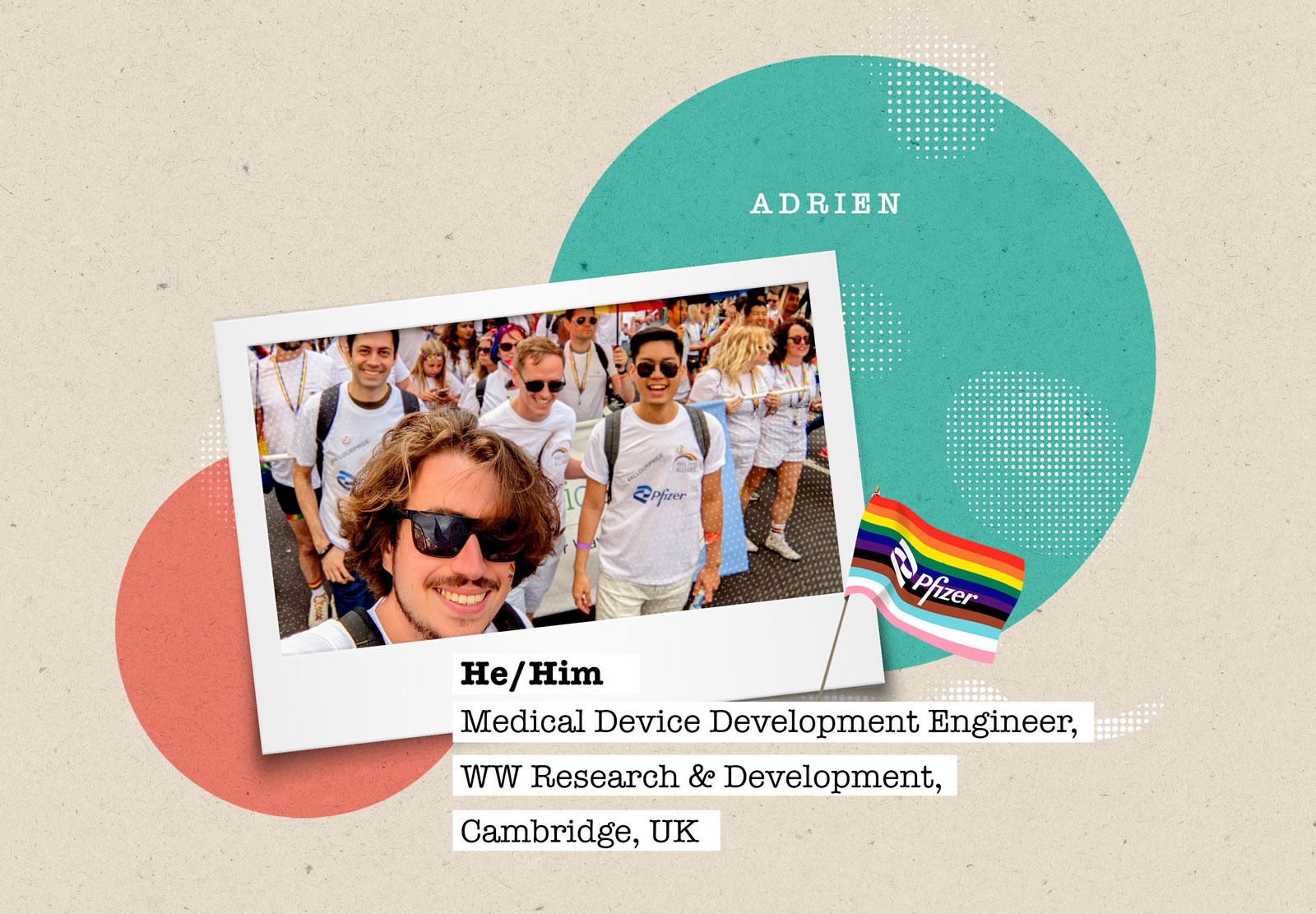
This is a story that will make you feel good. This is a story about happiness and pride. But getting there wasn’t without its hurdles. As a member of our community, I am aware that my story also comes with privileges.
My name’s Adrien, and I’m a bisexual man. Those are words I have uttered to myself for a long time, and only later to a handful of friends. Like many before me, I have kept the door of the closet only slightly cracked open.
Being in a long-term mixed relationship allowed me to pass as straight for a long time. This was a blessing in the world of heavy industry, which isn’t broadly qualified as progressive. But it was also a curse as I didn’t realise how not expressing my true self outside of my inner circle was harming me.
After my marriage ended, I moved to a small town in central France. Having hit a low, I was ready for a new start in my life, and things were great for a while. My mental health was getting better and eventually I was dating again.
Inevitably in that small town, I was seen in a restaurant with another man, who became my boyfriend. What seems like an innocent picture triggered a series of events I could not have imagined. That moment quickly became the favoured topic of conversation in the company I was working for, and everyone had an opinion. Never had I felt more exposed and alone in my life. Allies were nowhere to be found, and social restrictions in early 2020 ensured that my only immediate social circle would be my colleagues. This was a bad place to be. Anxiety, isolation, degrading comments, and one instance of physical assault tipped me over. I handed in my notice and once again went looking for pastures green. This is where the joyful journey begins. This is where I start anew again.
When I joined Pfizer, I felt like I had landed in a new world.
I was suddenly in a new country and speaking a different language, which strengthened that sentiment.
There I was, in a company where on day one I learned about a colleague resource group. People like me. Suddenly, I felt a sense of belonging and community. I joined the OPEN CRG as soon as I could.
Eventually, in July 2022, I had the honour of organising Pfizer’s attendance to the Pride in London march. After all this time, I was suddenly waving a rainbow flag in the streets of London, out for everyone to see, surrounded by colleagues, friends, and allies. Bliss at last. I feel incredibly lucky to have such a network around me, to feel safe and supported.
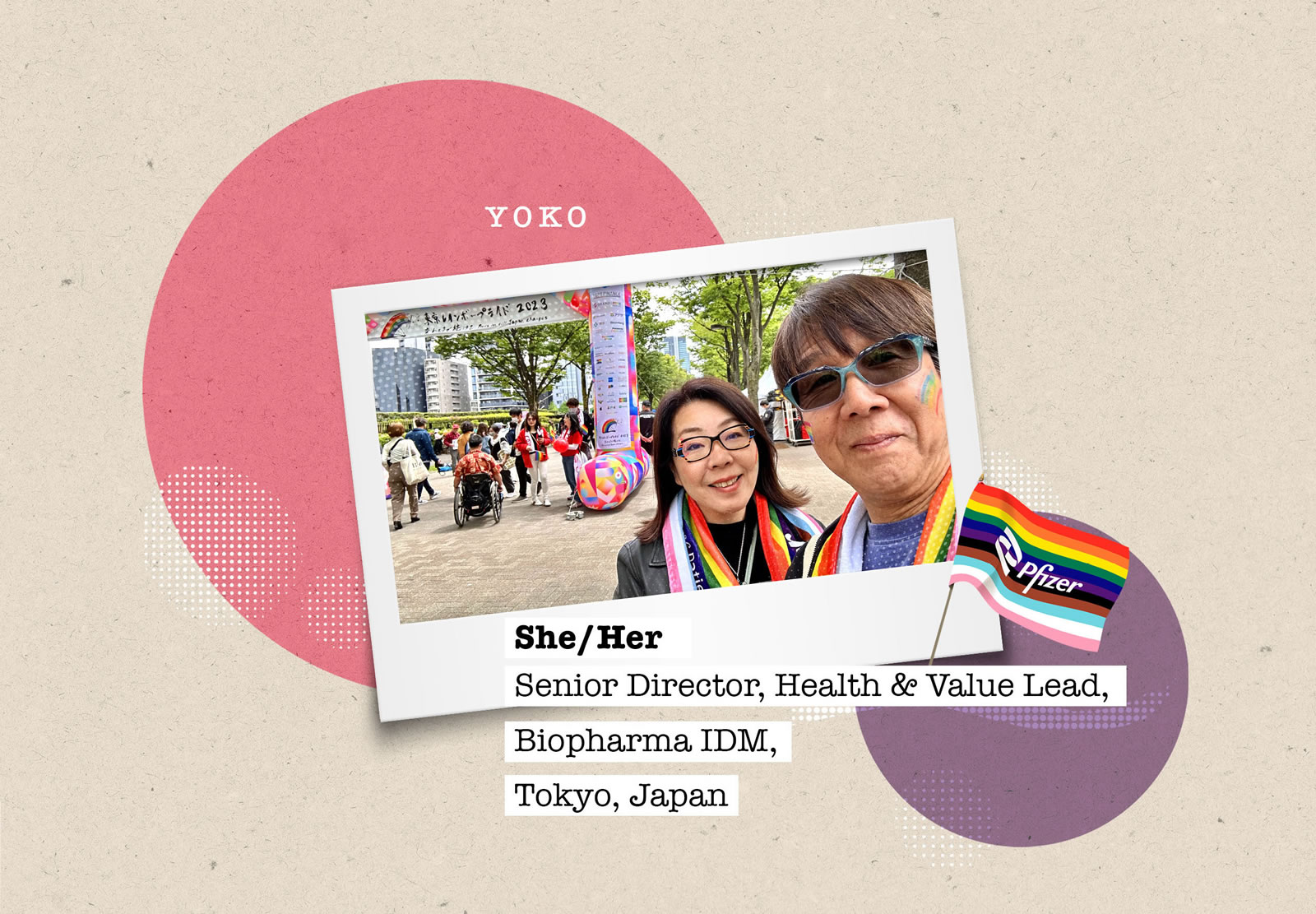
Participating in Tokyo Rainbow Pride 2023 this past April had a profound and powerful impact on my perception of LGBTQ+ issues and involvement as an LGBTQ+ ally. I felt a sense of mission like never before to realize a more diverse society where everyone can be their true selves. Tokyo Rainbow Pride 2023, one of Asia’s largest LGBTQ+ related pride events, was held in Yoyogi Park, with 240,000 people taking part. I participated in this event for the first time, with several Pfizer colleagues and their families, including my husband. I am delighted to share my story of how my perceptions and attitude towards LGBTQ+ people have changed over the years, along with the changes in Japanese society, and my involvement with “OPEN in Japan” activities at Pfizer.
When I was a student in the late 1990s, sexual orientation was rarely discussed in school, and there were very few celebrities who came out. At that time, it was far from a culture that embraced the LGBTQ+ community. In my school, those students were often isolated because they were considered “strange” or “different.” Even teachers didn’t know how to deal with these students appropriately. What about me? I don’t believe I had any discrimination or prejudice toward LGBTQ+ people at that time, but I may have unintentionally avoided getting close to them because I felt I didn’t know how to interact with them. When I think about it now, I deeply regret that I didn’t take the opportunity to listen and get to know them. If I had been a more supportive ally, maybe they could have felt more empowered to be themselves instead of suffering in silence.
In the 2000s, various LGBTQ+ groups and non-profit organizations were established, and many initiatives to advance LGBTQ+ rights were launched at the local government level. Since around 2015, activities aiming to establish a society where LGBTQ+ people can live with pride in their own way have made great progress, as the number of companies promoting DE&I has increased rapidly across various industries and the circle of support for LGBTQ+ people has expanded in Japan. Pfizer Japan is one of these companies. In 2019, Pfizer launched “OPEN in Japan,” a company-wide LGBTQ+ support initiative assisted by colleague allies, aiming to create an inclusive workplace environment where everyone can feel accepted and fully unleash their potential. Since then, Pfizer Japan has been actively engaged in raising LGBTQ+ awareness both inside and outside the company, offering self-learning tools, lectures, and speaker events with members of the LGBTQ+ community, non-profit organizations, and collaborative projects with “OPEN in Australia.”
In addition, in 2021, Pfizer Japan updated its policies so same-sex partners are treated in the same manner as legally married spouses. These activities have been recognized, with Pfizer Japan receiving the Gold rating as an LGBTQ+ friendly workplace in the PRIDE Index 2021 and 2022. The PRIDE Index in Japan was started in 2016 to evaluate corporate efforts in supporting inclusiveness for LGBTQ+ employees. What’s more, Pfizer Japan concluded a partnership agreement with the Tokyo Metropolitan Government in December 2022 in the areas of welfare and health, which will allow us to expand the scope of our pro-equality activities and help build a more inclusive society.
These company-wide pro-equality activities have truly inspired me and lifted my passion to contribute to the advancement of LGBTQ+ rights at Pfizer Japan and in society at large.
Meanwhile, the role to lead “OPEN in Japan” activities on behalf of the country leadership team opened up when former lead Stuart Sowder left the Japan organization. I was eager to take up this role and applied for it late last year. Since then, I’ve been actively involved in the planning and implementation of “OPEN in Japan” activities, partnering with Asami Okada, the co-lead of the LGBTQ+ colleague resource group.
One of our 2023 activities was the participation in Tokyo Rainbow Pride 2023, which had the theme “Press On Till Japan Changes.” About 240,000 people participated in this event and 10,000 people marched in the parade. All involved expressed their feelings and support in a variety of ways; rainbow-colored face paintings, hats, T-shirts, accessories, flags. Surprisingly, there were also lots of dogs in rainbow-colored costumes participating in the events and marching in the parade! The shops and companies around that area also incorporated rainbow colors into their shop/company logos for the event. Everything was so bright and colorful. I felt that the entire Yoyogi/Shibuya area was enveloped in rainbow colors.
During the approximately 3-kilometer march, sidewalks were packed with supporters, cheering on those marching in the parade and shouting "Happy Pride!" At the finish line, tens of thousands of people greeted us with big smiles. I was truly amazed and heartened by everyone's passion to support LGBTQ+ rights. Everyone looked brave and radiant.
This was a moment of joy that showed it’s possible to create an environment where people can live their lives as who they are. And it was also a moment when I made a commitment to do whatever I can as an ally.
I am truly proud of working for Pfizer Japan, a company that embraces DE&I and offers a variety of policies and benefits for LGBTQ+ colleagues and their families. With the slogan of "Stronger Together," I am very much looking forward to driving “Press On Till Japan Changes” as a LGBTQ+ ally to realize a truly inclusive environment where everyone can feel accepted as who they really are.
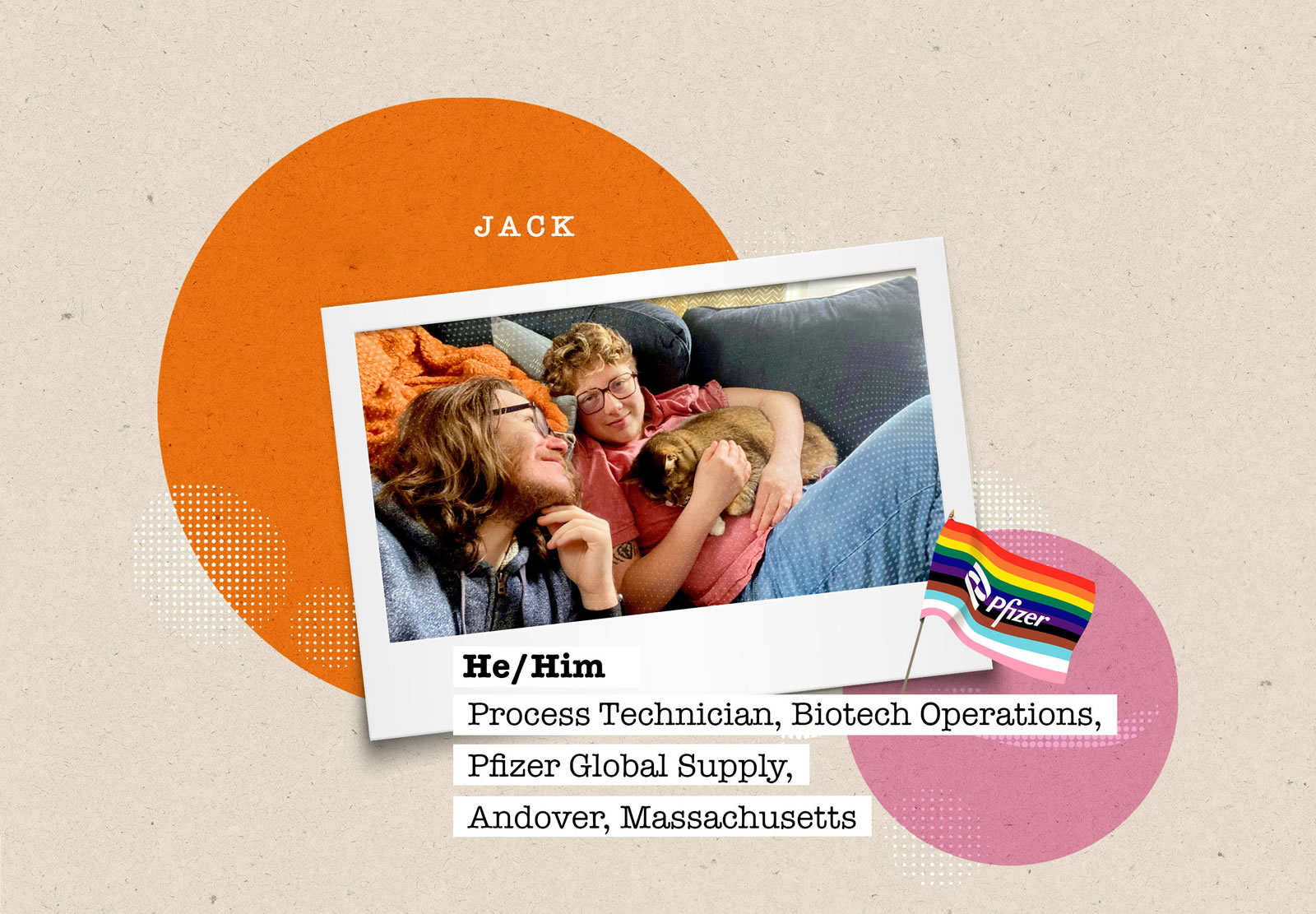
There is a poem I read recently about radical recognition of joy and appreciation, and the words have since stuck with me. The poet speaks of clapping with one hand; not against your leg or the table, but just sort of flapping. It’s a funny thing to picture, although maybe a common one for those of us who are physically expressive. But what if everyone claps with one hand? If we were flowers flapping around as such—daisies or tulips or sunflowers reaching toward the sun—we would surely bump into one another. Palm would find palm and over time the applause would grow to that of an audience released from the invisible grip of a beautiful performance.
I like this a lot because it is a little silly. It does not translate perfectly as a metaphor, and you would have to be pretty coordinated with those around you to get a good clapping sound all the time. However, things are hardly ever perfect in life. This reminds me that emphasizing recognition of positivity will not be perfect. You cannot sustain constant joy and appreciation, but little actions and moments can change your life and make the world come alive. All you must do is take the time when you think of it to practice gratitude.
This is the best way I can describe my approach to the “stronger together” attitude. Not everyone will align with your values, become your greatest friends, or even want to put in the work to be stronger together.
However, simply allowing yourself to make and recognize small efforts to benefit the community can really make a difference in the quality of work relationships, which in turn improves the outcome of the work.
A huge part of these small efforts is to radically accept each other as we are and encourage individuality. Uniqueness is both temporary and ongoing. Everyone will always be their own individual person, but that uniqueness may inspire someone else or make them feel safe enough to be themselves, too.
I am the only out transgender person in my area at work that I know of. It can be scary at times, but I know that being open about my identity will only help other trans and queer people feel safe and comfortable in this workplace. It is difficult already for many to maintain a healthy relationship with work in this society. Having to be closeted or feeling uncomfortable due to a lack of acceptance can put an immense strain on this relationship, causing the quality and balance of work-life to decrease.
As I become more outspoken about who I am, there is growth within our community, and we become stronger. This is the case in so many instances, yet I often must remind myself to speak up and be proud of who I am. The more individuality there is, the better we can accommodate for each other and improve how we function as a team. Incredibly, we can only be stronger together by being ourselves.
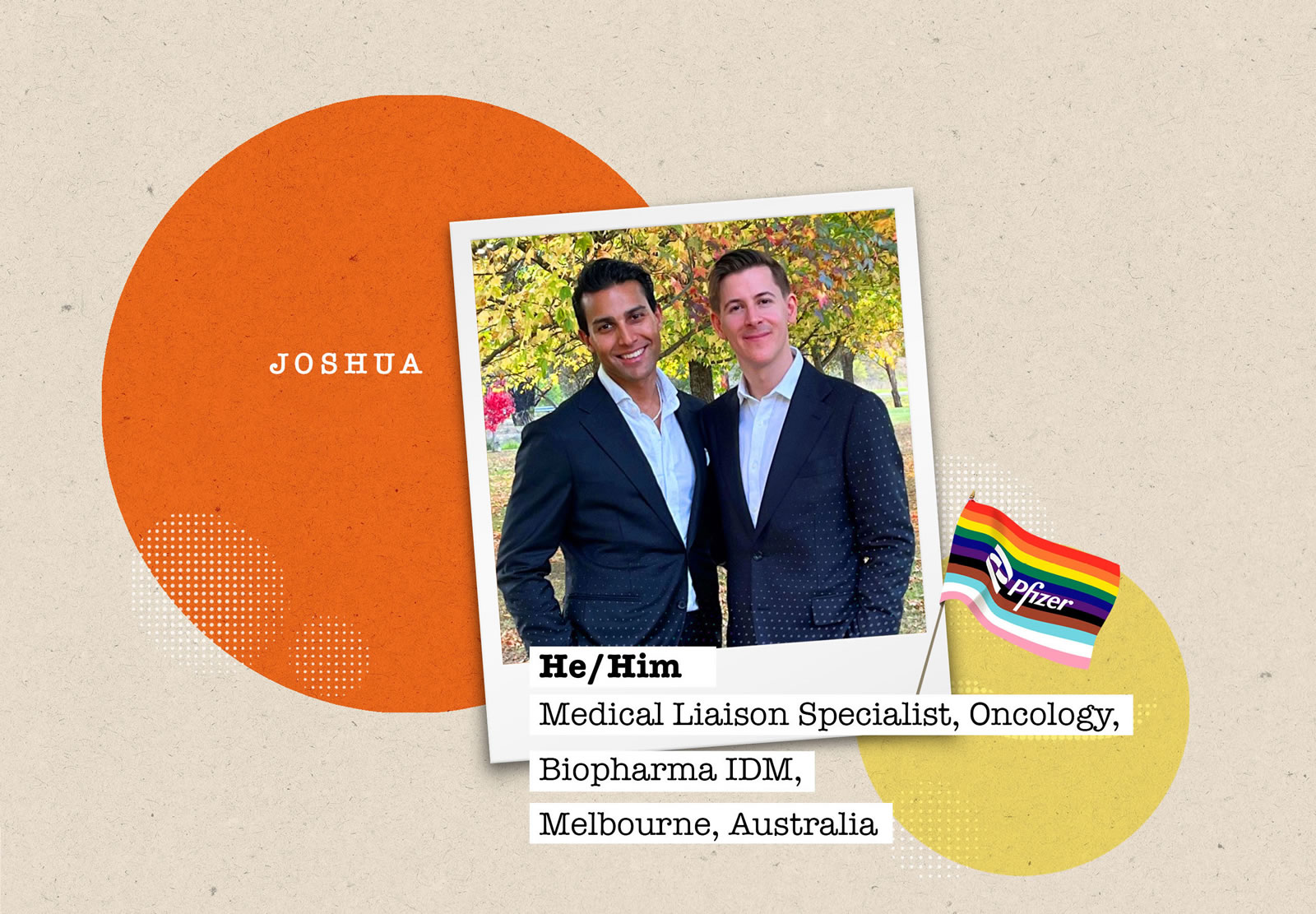
My name is Josh. I’m a millennial and my pronouns are he/him. I was born in the 90s, the only boy and middle child in a family of three children. I have one older sister and one younger. In primary school I was the only brown kid in my year level.
I was born in Moonee Ponds in Melbourne, Australia—the son of staunch Catholic public servants. For context describing my parents as conservative would be putting it lightly. By age 7 I was able to recite all liturgical prayers from memory and by age 12 I was delivering gospel readings at morning mass on Sunday. Religion was always going to be a big part of my upbringing.
High school was an interesting experience. My parents would settle for nothing less than a private Catholic all-boys school following as closely as possible in the footsteps of my father and his Jesuit-led secondary education, before he migrated to Australia. It was considered a normal upbringing for my Anglo-Indian parents to attend boarding schools where they grew up in Calcutta, India, and I often joke that if there happened to be an all-boys, Catholic military academy in Australia, then my parents would have hit the trifecta. I enjoyed sports, playing soccer and football throughout high school, but looking back there were clear signs that perhaps I might be a bit different from the other boys.
For years I thought I might be bisexual or gay but it just wasn’t a common thing when I was in high school.
It took me years of private practice to be able to say the word “gay” into the mirror without a paralyzing feeling of shame—that was the extent of the indoctrination.
You are led to believe it’s some terrible thing to be and that somehow you will be letting your family down (and letting God down) just by being this way. Of course, this is not the case but try telling that to a compulsive closeted teenager who doesn’t want his secret to be leaked.
I have always been somewhat masculine-presenting, and I understand the safety that comes with it. I have never immediately been singled out for my mannerisms or for the way I talk, and for this reason I was able to fly under the radar for a long time without many people suspecting my sexuality. I have close friends who are slightly more feminine-presenting, and they do not have this privilege.
I can vividly recall a situation in a previous workplace; only a short while after meeting my colleagues for the first time, one person asked me “what does your girlfriend do?”
When you hear this question, you immediately think about your safety—is it safe to correct that erroneous assumption with “sorry but my partner is a guy” or will that result in negative treatment? I don’t have many regrets in life but that moment is one that makes the list—I chose not to correct that person, instead simply replying, “I don’t have a girlfriend,” and through this choice remained closeted.
It was 2015 when I met my partner, Cameron. He was in the second year of his undergraduate studies, and I was halfway through a master’s degree. We attended different universities but insisted to our parents and their friends that we had met while at university (we met on a dating app). We have been together for over eight years. Our respective parents are both accepting of our relationship after a bit of a rocky start.
When I received the email calling for submissions for the Pride Journal, I initially thought twice about writing this down and what consequences it may have. But I realize there may be others who have felt or are currently feeling the way I did.
LGBTQ+ people are still criminalized in 67 countries around the world. Eleven of them still even enforce the death penalty. There is still a lot of work to be done.
Thinking back to that situation in the workplace, I seriously regret not stopping and correcting them to say, “I don’t have girlfriend, I have a boyfriend and he’s a scientist.” I am now open about my sexual orientation and whenever the topic of partners comes up in conversation, I make it a clear point to use he/him pronouns. I have never had any issues or difficulty discussing my partner or personal life at Pfizer and this submission is a testament to that.
I have friends who are in the Gen Z cohort and even the subsequent generations and it gives me so much joy to see how open and welcoming they are to people who may be slightly different to the majority. They see points of difference as positive attributes and they celebrate them. These days it is not uncommon to know openly LGBTQ+ individuals in high school; they respect the pronouns of their peers, and while there is still a long way to go in terms of widespread acceptance, this generation is by far the most progressive. From where I am standing the future looks bright.
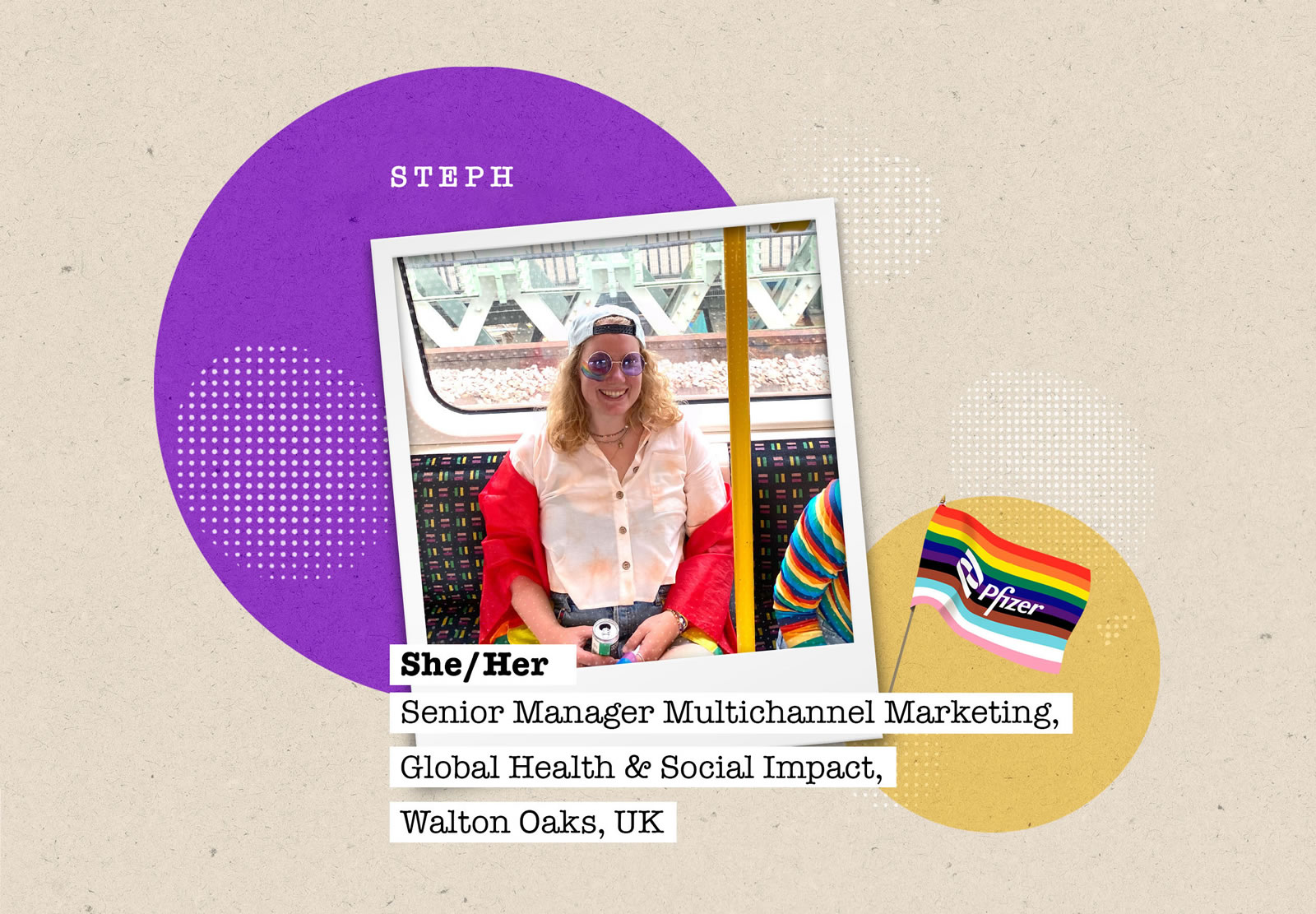
Realising you are queer when you’ve only ever been in straight-jacketed spaces feels like being stuck underwater. At home, at school, at university, at work. Bound.
When all the feelings you’ve heard about love in music and movies wash over you like a tidal wave: for a girl. You inhale sharply just before the wave hits. An inhale that could never be matched with an exhale. Hold your breath, hold it all in, lungs maxed out.
Underwater, you feel your arms strapped down by the straight jacket. Fear. Panic in your eyes, brain in overdrive. No, not me. This isn’t real. Is this real?! Oh, oh no. This is me.
Loneliness as you sink down, away from the surface. Bound with no way out. Down, away from your people. They can’t see the whole of you. Alone. You exhale a little. Bubbles burst out. A pang of fear through your chest. You try to speak but no words come out, stuck at your mouth.
Alone. The ache for fresh air. No, you can’t swim up, come out.
The inner fight wages on. You get tired. The primal fear subsides.
It takes time but you learn to breathe underwater. Acceptance on the inside stops you floundering. You rise a little.
Some of your people are swimming at the surface, looking up, you can see their legs splashing above. The fabric of the straight jacket has loosened, you can wriggle around a little more. The buckles have rusted away, the straps loosen and come free. You rise up, bit by bit.
Nearer the surface, you tug toes, testing who is ready to see you; whole this time. Released from the restrictive straps. Confusion flashes across faces, then recognition. Some take a deep breath and join you in the depths. Some kick away. Some see you through the water’s distortion. Hold on to the ones that join you.
Stronger together. You break the surface, gasping. Still scared. Free.
Together you feel the sun on your faces. Together you love free from straight jackets. Queer: fluid like the water that forms the waves. And it’s wonderful.
Support queer spaces. Ask people’s pronouns. Don’t assume partners. Come to a Pride celebration.
Thank you to all the LGBTQ+ heroes that have come before us and our allies. Especially to the trans women, Marsha P. Johnson and Sylvia Rivera, and icons like, Stormé DeLarverie for their protest and pursuit of freedom. We wouldn’t be here without you. And to those who are still fighting for liberation, at risk of physical harm or even the end of their lives for living as their authentic selves: we are here with you.
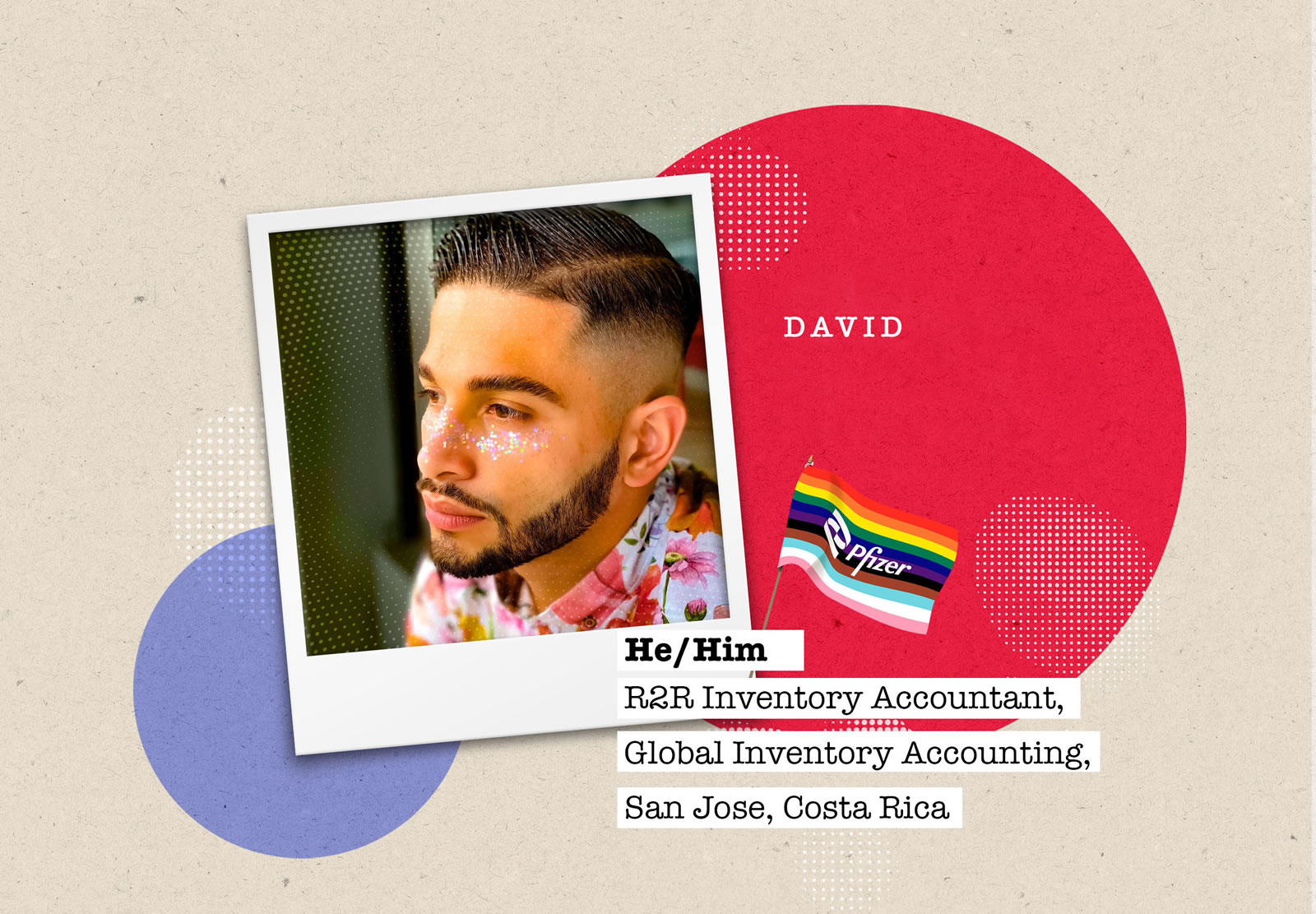
I have around twelve years’ experience working in different places, and this has given me the opportunity to distinguish between a healthy and toxic environment. And I’ve learned to see the kindness in people as each one of us is struggling with our own demons. In my personal travels I have been able to see that each step counts toward building a utopic place to live—and not just for me, also for the incoming generations.
I’m pleased to see younger people embracing the freedom to show their real colors.
At the beginning of my professional life I was not comfortable expressing my true self, so destiny gave me the opportunity to change my life completely by changing my company. When I decided to look for a new company, I asked people I knew, “How diverse is Pfizer?” I wanted to be sure my new company would have open and safe spaces for every single person.
During the past almost three years working at Pfizer, I’ve been part of some Diversity, Equity and Inclusion committees because I don’t want to miss a single opportunity to create a lovely place to work for current and new colleagues.
I always remember when a team lead told me, “If you want a change or if you are looking for something that is not available, you need to be part of the change, you need to find a way to change it or build it. Complaining will get you get nothing.”
It inspired me to be an active member of the DEI community, to support the OPEN CRG, and ensure Pfizer is a place where colleagues can be their true, authentic selves.
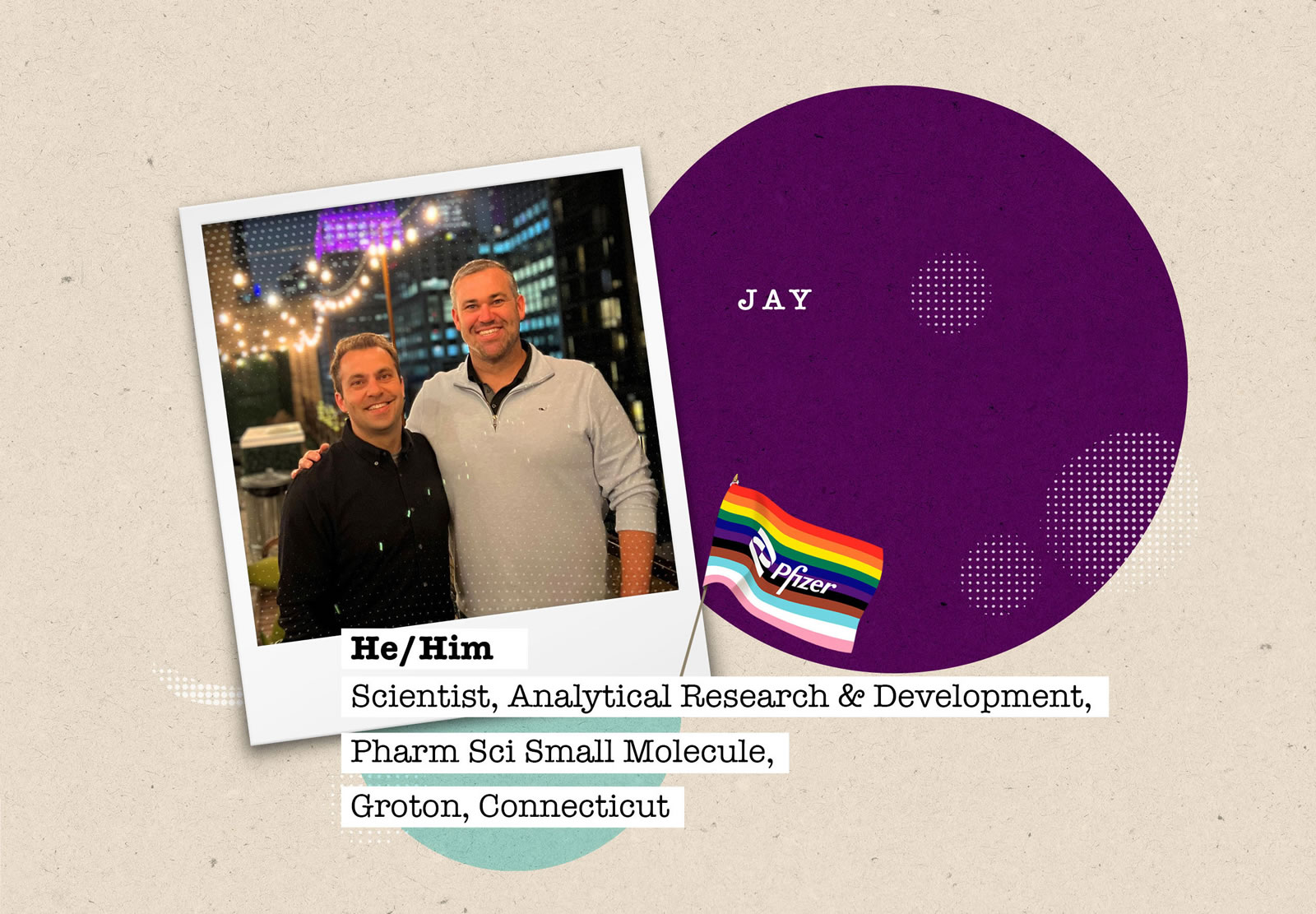
Growing up, my life revolved around sports. Being a part of many sports teams cemented the fact early on that I wasn’t like the other guys. But, at the time, there weren’t a lot of visibly open gay people or anyone in my life I could relate to. Throughout high school and into college, I slowly found myself and came to terms with who I am. It was a journey; a journey that opened my eyes to the power of allyship and gave me the courage to move to Orlando, Florida, to start my career, which ended up being the best decision of my life.
Though I was out, I was still selective about when, where, and how I shared this information. I had always wanted people to “get to know me first.” Know that I love watching and playing sports, doing CrossFit, hiking, exploring national parks, and craft breweries and “oh, by the way, I’m also gay.” In Orlando I was finally the person I wanted to be, the role model that I always needed. In my mind I was redefining stereotypes and just being me. All of this led me to meet my partner, Ben. We felt safe in Orlando and built an incredible life together, and then, on the morning of June 12, 2016, all of that changed and our world was rattled.
I had gone down to West Palm Beach to see a concert with friends the night before and awoke to a call from Ben. I don’t remember how the conversation went, I just remember him saying, “don’t worry, I put a post on social media, letting everyone know we’re safe.” Safe? What? “I’m also texting and calling all our friends to make sure everyone is alive.” Wait. What is happening? “There was a shooting at Pulse last night.” We finish our conversation and I finally check my phone. I have countless missed calls and text messages from people checking in on me. I open social media and will never forget the message that immediately pops up, “Your location is set to Orlando, FL. Do you want to mark yourself safe from the Pulse Shooting?” For one of the first times in my life, I am scared. Scared of who I am and who I love.
For the next couple hours, we contact all our friends and finally learn that everyone is safe. We were incredibly fortunate, others in our community were not. Ben and I had been to Pulse so many times in our Orlando tenure. It was a place of welcome, of celebration, of love—and instantly it was demolished by an egregious act of hate. We spent the three-hour drive back to Orlando listening to the radio, which called for anyone in the Orlando area to consider giving blood because many victims are still being treated. Unfortunately, our community is unable to answer this call because outdated restrictions prevent many gay people from donating blood. Feelings of devastation and hopelessness set in as the tragedy unfolds. And then, the narrative changed.
Halfway through our drive, the radio announces that the lines to donate blood are hours long. Allies showed up, and stood in line outside in the June Florida sun no less! People brought food and support to the hospitals for the doctors and nurses treating the victims. Stories started to unfold about the selflessness of police, firefighters, and EMTs who saved many people. Countless Orlando bars, restaurants, and stores displayed rainbow flags and stickers saying, “Orlando United.” Friends took time off work to fundraise and provide support for the community. Orlando City Soccer Club held a Pride match and put a permanent memorial in their new stadium; 49 rainbow seats to honor the lives lost. The city proved we are stronger together and let the world know hate is not welcome in the city of Orlando.
As I’ve continued my journey, I’ve learned the importance of being authentically “me.” I’ve learned to be the role model and ally that younger Jay needed.
I’m not always perfect at it—sometimes I hesitate when my orientation is assumed, but I’ve also appreciated giving people the opportunity to surprise you with their allyship or promote an opportunity for education. I’m proud of who I am. I am proud to work for a company who raises the rainbow Pfizer Pride flag for the month of June because it matters to me.
There are a lot of people who ask the questions, “Why do we need Pride parades?”; “Why do we need a Pride game?”; “Why do we make a big deal when an athlete comes out?” and the answer is, because it matters to someone.
Inclusiveness, visibility, allyship—these all matter.
As a kid, if I had role models like Robbie Rogers, Alec Smith, or Carl Nassib, my self-discovery may have been far less complex. I am fortunate to be surrounded by an incredible support system made up of my family, friends, and colleagues, but not everyone is born into that privilege.
The day after Pulse occurred, the city of Orlando held a vigil for the 49 victims. So many people showed up. Within 24 hours, I went from being the most scared I’ve ever been to feeling the safest and most welcomed. As allies, we all have this power. We can provide an environment where every person can thrive and be stronger together.
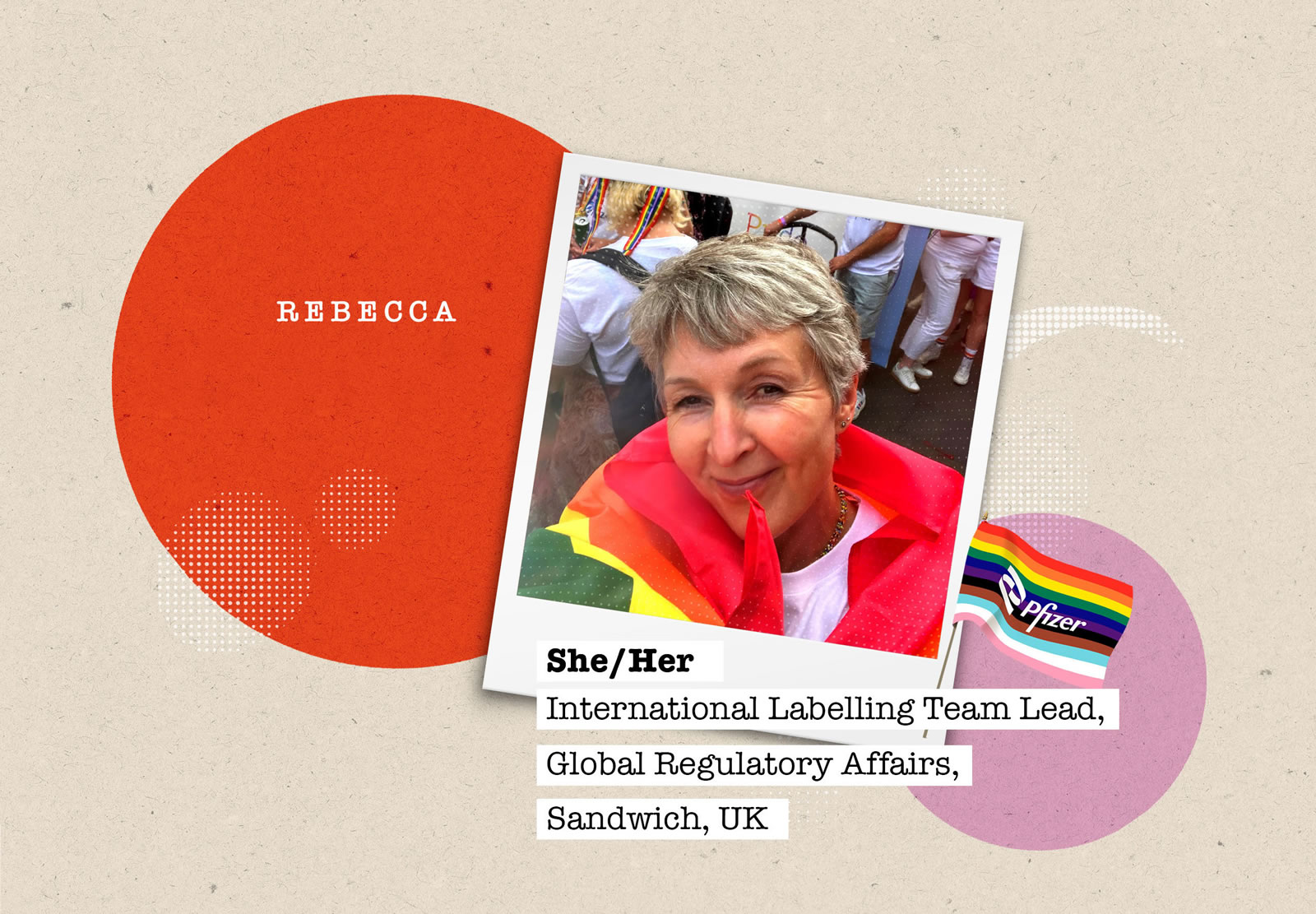
My journey to becoming an ally to the LGBTQ+ community at Pfizer started with simple acts of friendship to a new starter in the office. We discovered we’re both members of OPEN UK and joined forces to raise the profile of the group in Sandwich. As a woman raised under the banner of equal rights, I believed that since gender should not be a barrier to equality, then neither should gender identity or expression or sexual orientation. In my opinion at the time, being straight, gay or lesbian had no bearing on a person’s contribution to making a medicine. But I was missing the point. Dare I say it… I was wrong.
Around the same time, whilst on holiday with my family in New York, I encountered Pattie Gonia, an environmentalist drag queen and advocate for LGBTQ+ inclusion in outdoor spaces. They were doing a photoshoot which started a conversation with my teenage daughters that—with hindsight—changed the course of my career. To my surprise, my daughters were fluent in LGBTQ+ inclusive language and had a wide social network of straight, gay, lesbian and bisexual friends. They sat me down to watch Ru Paul’s Drag Race, embraced my naivety and taught me how to correctly use contestants’ pronouns.
It dawned on me that LGBTQ+ tolerance is the bottom rung on the ladder of inclusive behaviours. For me, learning how to use gender neutral pronouns took me to the next rung up. Curious to know more, I attended the OPEN Colleague Resource Group’s ally training. Meeting the ally co-lead at the time, Jane Finch (she/her) and her daughter Lizzie (they/them), opened my eyes to how complex it can be for families to navigate coming-out, and how this might coincide with the time that a young person embarks on their professional career. This took me ‘full circle’ back to that encounter in Brooklyn Heights, as I realised that the kindness and visible support of allyship, to young people especially, needs to start long before there’s any hint or revelation of coming-out.
The more energy I’ve put into supporting OPEN, the more I’ve got out of it both personally and professionally, making friends and developing leadership skills. Like most active allies, I continue to make mistakes and I continue to learn. I have been privileged to meet LGBTQ+ colleagues, inclusion professionals, athletes and drag queens. I’ve witnessed first-hand the difference that a supportive ally network can make to a colleague who feels vulnerable about their gender identity. Most recently, the LGBTQ+ community invited me to join their PRIDE celebrations in London, where I was in the cisgender-heterosexual minority, yet felt very welcome and included.
I freely admit I’ve changed my opinion about why LGBTQ+ diversity matters. It does make a difference. Gender identity or expression and sexual orientation are not characteristics to be quietly ignored, or at best tolerated. They make us—every one of us—who we are.
Our individual uniqueness should be celebrated, and our combined diversity will make us unstoppable.
I have been fortunate to be co-lead of OPEN UK chapter since 2020. This chapter exists to deliver activities and resources to engage with and build the OPEN community in the UK. We aim to raise levels of inclusivity amongst LGBTQ+ colleagues and allies by celebrating events in LGBTQ+ calendar at in-person events, via our regular podcasts and through our internal virtual platforms. My experience with OPEN has broadened my horizons and next month I will start a new role as the Diversity Equity and Inclusion UK Lead. I hope that one day every gender identity and expression and sexual orientation is represented at Pfizer, working alongside colleagues of every race, ethnicity, and ability.

I was born and raised in the Salt Lake City, Utah, area. From an early age I knew I was different but didn’t know why. In the community I grew up in I knew instinctively that it was not acceptable to be different. I knew my community would severely punish me if I ever revealed what made me different. I did my best to hide my authentic self out of fear, so I donned a mask and was an actor in a play to hide my secret.
In high school I learned enough about the world to know that the difference I hid from my early childhood is that I am transgender. The world was very hostile to people like me, and I knew my community would not accept me. I continued to hide my authentic self behind my mask. I wrapped myself in a cloak of denial so I could hide my authentic self from the world. At times I was able to even hide from myself.
In my early twenty’s I decided I wanted to leave the state of my birth to, in part, escape the oppressive community I was a part of. I did this the best way I knew how and joined the United States Air Force. After my initial avionics training, I was stationed at McConnell Air Force Base (AFB), Kansas. While I enjoyed my time during active duty, I still couldn’t take off the mask to be my authentic self.
While stationed at McConnell AFB, I found my amazing wife, who I love dearly. She loves me for who I am and that makes me love her even more. We have been happily married for 10 years. We have two wonderful children that we brought into this world. My family brings me an incredible amount of joy.
When I was on active duty, I suffered an injury that made my duties impossibly difficult, so I didn’t reenlist. At first, I continued to work in avionics with a private aerospace company in Arizona and then with the United States Air Force as a civilian in Utah. The injury I suffered continued to deteriorate, so I needed to make a career change to survive. I did an advanced automation certificate program for technically skilled veterans, and it was from here that Pfizer recruited me.
Four years ago, one of the first things that struck me as I joined is that Pfizer really cares about the whole colleague. This was a major surprise as it felt like the United States Air Force just wanted me to be combat effective and the private aerospace company just cared that I produce. I was glad that Pfizer encouraged colleagues to bring their whole selves to work.
The recent pandemic was an incredibly stressful time for me. In the fall of 2020, I could no longer afford to keep using the ever-increasing mental bandwidth it took to hide myself. I finally needed to take off my cloak of denial and admit to myself that I am a woman.
In June of 2022 I had the courage to bring my whole self to work and it has brought me joy that many of my colleagues have been supportive of me. I received wholehearted support from Pfizer with my transition and for that I am grateful. I am extremely glad I can live as my authentic self at work without fear.
After socially transitioning at work, I had the mental bandwidth to get involved in the Diversity, Equity and Inclusion (DE&I) space at my site. I joined the DE&I council and helped launch the local Veterans in Pfizer colleague resource group (CRG) at my site. Since learning about CRGs, I wondered why my site didn’t have an OPEN chapter.
I wanted to do my part in making Pfizer an amazing workplace for all colleagues and especially LGBTQ+ colleagues and their allies.
When at a DE&I council meeting at the end of last year I volunteered to start an OPEN chapter at my site, and this year I did.
My work with OPEN has opened my eyes to support I didn’t know the LGBTQ+ community has at my site. I have joy that I have been able to create a space where colleagues are able to bring their whole selves to work. I wouldn’t have been able to launch and lead the McPherson OPEN chapter without the fantastic support of many of my colleagues. Thank you to all the colleagues who support the LGBTQ+ community.
The LGBTQ+ community has been under attack for a long time. There are people that have tried to make our existence a front in culture wars and have tried to erase us.
I am grateful to corporations like Pfizer that are supportive of the LGBTQ+ community, advocacy groups, and allies in showing the world that we exist and our rights are human rights.
We are stronger together in advancing equity for the LGBTQ+ community.
02.19.2026
02.17.2026
02.05.2026
02.04.2026
02.02.2026
